
Every year, the Caribbean is frequently threatened by deadly storms and other hazards such as floods and earthquakes. Despite this, there are still gaps in the legal and policy framework regarding the facilitation and regulation of international disaster relief in the Caribbean.
Mr Ariel Kestens, Head of Delegation for the IFRC Dutch and English-speaking Caribbean, said: “While the scale and frequency of major disasters affecting our region has increased significantly, the legal and policy frameworks that regulate our capacity to respond to disasters have remained largely unchanged.”
IFRC in partnership with the Caribbean Disaster Emergency Management Agency (CDEMA), established the Regional International Disaster Response Law (IDRL) Working Group to be a key driver of law and policy change in the area of international humanitarian assistance.
The Executive Director of CDEMA, Ms Elizabeth Riley says that having the necessary laws and regulatory arrangements in place is critical to effectively meet the humanitarian needs in the aftermath of disaster events.
As a sub-committee to CDEMA’s Technical Advisory Committee, the Working Group will provide Caribbean-specific perspectives, insights and recommendations for improving the regional regulatory framework for the facilitation and coordination of international disaster relief within the context of comprehensive disaster management.
The Working group is made up of National Disaster Organisations from Guyana, Dominica and St. Vincent and the Grenadines; National Societies from Belize, Dominica and St. Vincent and the Grenadines); the CARICOM implementation Agency for Crime and Security; the Caribbean Customs Law Enforcement Council; the Port Managers Association of the Caribbean; CDEMA; and IFRC.
The Regional IDRL Working Group will undertake advocacy initiatives and develop recommendations that will contribute to the strengthening of multi-sectoral engagement in international disaster response facilitation; integrating and coordinating humanitarian actors including multinational organisations and diaspora donors in emergency logistics coordination; and establishing and enforcing standards applicable to relief donations such as food and medicine, among other initiatives.